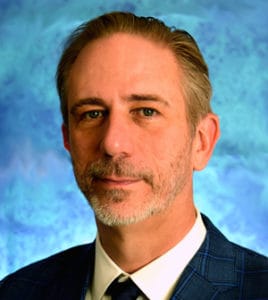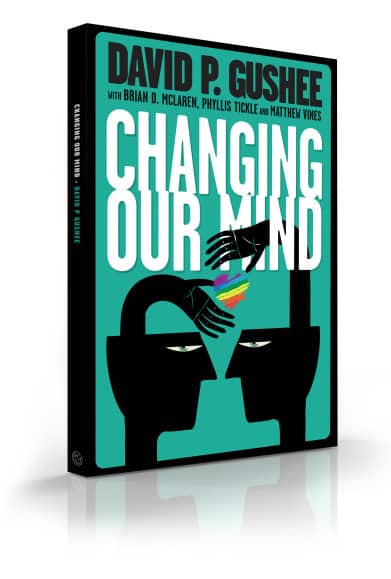 It’s about human dignity and Christian community
It’s about human dignity and Christian community
Dr. David P. Gushee is Distinguished University Professor of Christian Ethics and director of the Center for Theology and Public Life at Mercer University. He recently published Changing Our Mind: A call from America’s leading evangelical ethics scholar for full acceptance of LGBT Christians in the Church.
Tim Otto: There is an onslaught of books right now about Christianity and same-sex relationships. Why should people read yours?
David Gushee: I hope people will read it because it narrates my journey—biblically, ethically, theologically, and interpersonally—from a kind of unthinking traditionalist position to a passionate plea for full equality of LGBT Christians in the church and society. The book is noteworthy because as an evangelical scholar I use an evangelical ethical framework to redefine the issue from being a sexual-ethic issue to being a human-dignity and Christian-community issue. I tell the story of how I stood on the sidelines of the LGBT debate for 20 years while working on other issues to somebody who now sees the great harm that the traditionalist view and practices of the church have done to many, many, many thousands of young people and their families. I’ve moved into a posture of passionate solidarity with these sufferers and these beloved children of God.
Can you say a little more about what it was that moved you from the sidelines into the midst of this debate?
Gushee: I believe the Holy Spirit sent to me gay and lesbian Christian brothers and sisters who became an important part of my life primarily at my local church. As a Baptist minister and as a deeply committed church person, I care a lot about the church, its healthy functioning, the meaning of Christian community, and the practices of Christian community. I had the great privilege of being a part of a local congregation in which at first a trickle and then a flood of LGBT Christians begin to come our way when they realized we would include them in our life together.
My experience made the traditionalist position not only less and less plausible but more and more a violation of what it means to be the church. It also made certain interpretations of that handful of biblical passages [that seem to condemn same-sex practices] seem irrelevant because of the Christian sisters and brothers that I was getting to know. For instance, the Romans 1 language of depravity did not fit with the Christians I was encountering. It prompted me to reexamine the biblical materials and reconsider the whole issue. I teach a Sunday school class that’s a very intimate community in which we care deeply about each other. As gays and lesbians unexpectedly joined my class, we lived in Christian community together and change began to happen that moved me off the sidelines.
It seems you are arguing for a truth you learned from an experience. Shouldn’t Scripture trump experience?
Gushee: In my book in a chapter titled “Transformative Encounters and Paradigm Leaps,” I write about how the Bible records key instances in which experiences changed understandings of Scripture. Here are two examples. First, prior to Jesus, it would have been inconceivable—based on Scripture—to think that the Messiah who was supposed to come in victory would be crucified. But in the Emmaus story in Luke, “Their eyes were opened,” and they reinterpreted Scripture in light of their experience. A second example is the Holy Spirit-driven experience, or even Holy Spirit-“drenched” experience, in which Peter ‘s experience with Cornelius and other Gentiles caused him to say, “I have learned now not to call anybody profane or unclean.” It was experience with what God was doing in the lives of the centurion and his friends that altered Peter’s understanding of Scripture and Jewish law.
Evangelicals straddle two strands. We have a pietistic strand that believes in a powerful Holy Spirit who transforms and changes things. But we also have an Enlightenment, cognitive, rationalist strand that dictates that experience must not affect our reading of texts. I think that overly cognitive strand is very limiting for us and very unrealistic, because human beings are embodied, situated creatures who are always affected by experiences, and that is part of how God speaks to us.
So, Scripture plus transformative, Holy Spirit-led and -drenched experiences lead not to an abandonment of Scripture but to a discovery of either other Scriptures that have been ignored or neglected and/or a need for re-interpretation of the Scriptures that we thought were governing our interpretation of an issue.
It is interesting that you critique the rationalist strand in evangelicalism, because I can also imagine some evangelicals thinking that you rely too heavily on rationalist, academic interpretations of verses that seem to speak plainly against same-sex relationships. How would you respond to the concern that by doing so you’re taking Scripture interpretation out of the hands of lay people?
Gushee: It’s not some kind of hyper-cognitive project to read biblical commentaries, to read about cultural backgrounds, and to think seriously about the interpretive challenges of taking ancient texts and applying them in modern circumstances.
It isn’t adequate to read a handful of passages that speak negatively about same-sex activities and think that should settle it. It wouldn’t be adequate on any other issue: money, ecology, or work. Biblical scholars and church leaders are to use their gifts to help Christians understand as wisely and thoroughly and accurately as possible what biblical truth looks like when applied to the current context.
Another thing I’m saying about the LGBT issue is I really don’t think the six or seven passages about same-sex activities are the most relevant passages on this topic. I have discovered, even since I wrote the book, that the Christian infliction of rejection, exclusion, and marginalization toward gay people is epidemic. It causes tremendous pain, it fractures families, it breaks up Christian community, and it creates severe mental health challenges for young people. If that’s the problem then six passages about same-sex activity are less relevant than 600 passages about what it means to be a Christian community, what it means to take care of young people, what it means to love our neighbors as ourselves.
Given the importance of this issue, do you think it’s a question that Christians ought to divide over, and why or why not?
Gushee: I don’t think it’s a question that Christians have to divide over. I think it may be a question that Christians will divide over because of fundamental gulfs in how various people frame the issue and what they think is at stake. In the book I plead for us to stay in community with each other even when we disagree. But when I’ve lived through previous schism-producing issues—such as whether women can lead in the church—my experience is that churches will eventually decide either “yes” or “no.” A presenting issue often forces a decision. Inevitably practical matters must be decided, such as whether a gay couple can join the church or if a married gay person can be ordained.
Some Christians, like Pastor Ken Wilson, make the case for a third way based on Romans 14 and 15 [in which Paul tells Christians who disagree on certain issues that they should still “welcome one another”]. He argues that we shouldn’t make Christian community contingent on whether we morally approve of each other’s positions on every ethical question. Still, in my own church, people are peeling off because they think we’ve become too affirming of gay relationships.
Do you think that is a valuing of being “right” over Christian unity?
Gushee: Protestants, and perhaps especially evangelicals, don’t value unity highly. My experience is that most would rather be “right” and be in a homogenous community in which there is agreement. Of course, what often happens is that 10 years down the road a new issue arises, there’s not agreement, and then people leave again. There is a constant churning of people going from one community to another looking for unity on the “essentials” of the moment.
Could this issue present an opportunity to think more deeply about what constitutes the “essentials?”
Gushee: I certainly hope so. Just recently in my church we managed to come to an agreement about accepting an openly gay deacon, and then found ourselves at odds with each other over Ferguson and the failure to indict the white officer. After a while it makes me wonder, are we doomed to an endless round of splintering and fragmentation? We agree on one thing and then realize we have “intolerable” beliefs about other issues. We need a lot of schooling about what I would call a genuinely New Testament forbearance with one another.
How should we distinguish essentials from non-essentials?
Gushee: There is a difference between core doctrinal affirmations like the Nicene Creed or the Apostle’s Creed, and the orthodox heritage of the Christian tradition. In general, such theological affirmations should rank more highly in terms of essentials than moral arguments (though some moral beliefs rooted in the Ten Commandments or the Sermon on the Mount ought to have a pretty high status).
What often happens is that people begin with core moral beliefs about murder, stealing, adultery, and dishonesty being wrong. That all seems reasonable, but then culture presents a contested issue like race in America or gay marriage. We then tend to divide along predictable political or ideological lines. That is a boundary line to watch out for. Another thing that happens is that such issues are proxies for other issues. I’ve heard people say that to compromise on this issue is to compromise on the gospel. That is a deeply troubling formulation. I could just as easily make a case that the gospel is at stake in a more accepting position. But it is better to not raise the temperature of every debate by claiming that whatever the difference is it is a gospel issue.
One of the ways of “lowering the temperature” is to use the language of “disputable matters” (drawn from Romans 14 and 15), in which Paul says that Christians should remain in unity with one another even though they disagree about what foods can be eaten and holy days. Other Christians have responded that while both Jesus and Paul make it clear that certain laws about food and holy days are no longer to be observed, they also both intensified the rigor of the Jewish sexual ethic. How would you respond to that?
Gushee: I don’t think we’ve even begun to touch the deepest meaning of the LGBT issue when we confine that issue to being a sexual-ethic issue. It’s a marginalization-of-vulnerable-people issue; it’s a human-dignity issue; it’s a mental-health issue; it’s a spiritual-abuse-of-the-young issue. It’s about 13-year-olds who say, “Mom, I think I might be gay,” and get beat up or kicked out of the house.
Since my book came out I’ve heard from hundreds of people about their experiences of rejection, mistreatment, marginalization, abandonment, and mental health challenges. I’m going to lead with that, and I want to hear the opposition offer some kind of meaningful answer to that. Personally, if there’s something that I’d be willing to divide from other Christians over it would be over folks who would say that mental health problems, children being kicked out of families, and occasional suicides by gay teenagers are not a big deal. All that is a big deal.
I do not think that a handful of passages, all things considered, should rule out the inclusion of Christians who happen to be gay or lesbian in the covenantal ethic that is the church’s best sexual ethic. Five percent of the population has turned out to be gay or lesbian or bisexual, and we have excluded them from any participation in the Christian sexual ethic at all. We have said your only option is celibacy—and that’s at our most polite. There is a beautiful and very fruitful Christian sexual ethic that is one of the best moral traditions that we have—marital covenantal monogamy for life—and I’m suggesting that Christians who are gay or lesbian should be invited into that sexual ethic rather than be excluded from it. I’m not proposing a real change in Christian sexual ethics. I’m just proposing that gay and lesbian people, who we now understand a lot better through modern research and science and personal testimonies, ought to be grafted into the ethic that has been there all along for heterosexual Christians.
Any last things you’d like to say?
Gushee: I would say this: The release of my book has had the totally unexpected consequence of yielding a new kind of pastoral ministry for me. I’ve been contacted by LGBT young people, parents, ministers—and poignantly—50- and 60-year-old gay and lesbian Christians reflecting back on their experiences with families and churches and schools. A typical communication starts with something like this: “I never thought I would ever want to talk to a Christian minister again, but you’ve given me some hope” or “I’m a very damaged person because of what I experienced when I was in my very conservative family and came out as gay” or “I told my parents this summer that I might be gay, and I was physically beaten.”
I had thought that we were making some progress. In sophisticated evangelical circles the conversation has often moved past name-calling and vitriol and contempt, but in a lot of places it hasn’t. There are still so many suffering people who are so responsive to anybody who says, “I care about you; I’m sorry for your suffering; I want to stand in solidarity with you.”
I’m a Christian first and a pastor, and this level of suffering and people yearning for some care and help is breaking my heart, and it’s also reinforcing for me the significance of this moment and what needs to happen. We need to love our own LGBT children and care for the hurting and the broken. I’ve been surprised by the deep pastoral need that is there and by people reaching out to me and saying, “Can you help me?” or “Thank you.” I know that I’m on the right track. I’m fully confident, but it saddens me to see the level of pain that is out there.
Tim Otto is author of Oriented to Faith: Transforming the Conflict over Gay Relationships, serves as a pastor for an intentional church community in San Francisco, and can be followed at @OrientedtoFaith.



